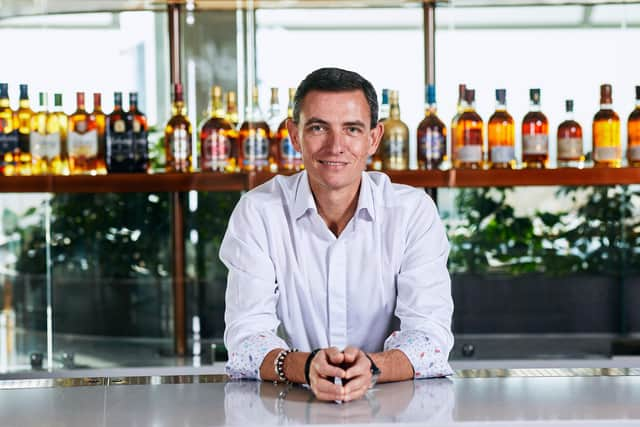The Big Interview: Chivas Brothers chairman and CEO Jean-Etienne Gourgues
Chivas Brothers’ whisky portfolio features brands such as Chivas Regal, Ballantine’s, Royal Salute and The Glenlivet, with the latter, billed as the original Speyside malt, having opened the doors to its new visitor centre last year. Additionally, the company in 2020 revealed that it had relocated its Scottish HQ from its historic base in Paisley to offices on Blythswood Square in Glasgow.
In September 2021, the firm cheered a 6 per cent jump in total organic sales in the year to the preceding June, with Mr Gourgues stating at the time: “It’s clear from these results that we are making a steady return to our pre-Covid momentum, already exceeding this in domestic markets. The breadth of our portfolio is our greatest asset, and we have continued to invest in innovation and creative campaigns despite the challenging year.”
Advertisement
Hide AdAdvertisement
Hide AdThe Parisian executive alongside the results also unveiled key environmental goals, for example targeting net-zero distillation by 2026.


Mr Gourgues prior to his current role had been managing director of Pernod Ricard China since July 2014, and before that served as president and chief executive of Pernod Ricard Japan. His CV also includes a spell on the Martell Mumm Perrier-Jouët executive committee.
You came to Glasgow for COP26 – can you give more insight into how your visit went, and what was achieved at the conference by the Scotch industry, which presented a special limited edition showcasing its green credentials…
I left COP26 encouraged about the progress the Scotch industry has made in sustainability. It is almost impossible not to feel galvanised after meeting and hearing from some of the best minds in the world who are passionate about developing concrete solutions to tackle climate change.
The COP26 conference was also a chance to showcase some of the achievements the industry has made over the past ten years, including a 34 per cent reduction of greenhouse-gas emissions, a 22 per cent improvement in water efficiency, and a 75 per cent reduction in waste to landfill.


These achievements have only been possible through collective action from all Scotch-producers, large and small. I’m particularly proud that in September, the Scotch Whisky Association (SWA) became Scotland’s first trade association, and the UK’s first food and drink trade association, to be recognised as a UN Race to Zero partner in the lead-up to COP26.
The COP26 limited-edition whisky, to which Chivas Brothers contributed, is the perfect expression of the unique collaborative spirit in our industry. We hope we can help inspire others in the drinks industry and beyond to join hands and keep innovating in the critical area of sustainability.
Chivas Brothers has been highlighting its own sustainability efforts, for example targeting net-zero distillation by 2026. Can you explain more about this – and is the firm doing enough?
Advertisement
Hide AdAdvertisement
Hide AdDistillation is an energy-intensive process, and that means any long-term solution to reduce emissions in our own operations has to start with distillation. Our priority is to drive super-low-energy distillation and then decarbonise any residual carbon emissions to reach net zero.
For us, long term, sustainable change in distillation requires an investment in new technologies like high-efficiency mechanical vapour recompression (MVR). In the distillation process, MVR recovers the energy from the spirit vapour and uses it again to boil the still – very much like a slowcooker, where the heat vapour is recaptured.
At Glentauchers, which is a major single-malt component of Ballantine’s, MVR has led to a massive 90 per cent energy reduction on a single potstill. We plan to roll out MVR across all viable sites by 2026.
We have also invested in fuel alternatives to help decarbonise any residual carbon emissions and we are delighted that our Braeval distillery is our first zero-direct-carbon distillery following a successful switch to a rapeseed-residue-based bio-fuel.
Packaging is another area of focus for us, and by 2025 100 per cent of our packaging will be recyclable, compostable, or bio-based.
Sustainability is a priority battleground for our business, and we are continually looking at ways we can further innovate or adapt to continue making measurable progress and ideally improve or bring forward our commitments.
How would you characterise the first few months in your current role, and what are your key priorities?
“Dynamic” is the word that comes to mind when I think of my time so far at Chivas Brothers. We saw the US tariff suspension in June, which was a monumental win for Scotch, then all eyes were on Glasgow in the autumn for COP26.
Advertisement
Hide AdAdvertisement
Hide AdThroughout all this, we’ve also seen the country go back and forth with Covid restrictions and seen significant impact to the global supply chain with all-time-low inventories and increased demand across the world post-pandemic.
This ever-evolving operational context means that we’ve had to shift into the next gear to ensure we stay agile and on track to regain our pre-Covid momentum. I’m fortunate to work with a large and highly engaged team across our 29 sites.
Previously, you led Pernod Ricard China, and believe the country will remain a strong growth engine for the business. Can you give more details on this?
China is such an exciting market for Scotch at the moment and I loved my time leading the business out there. Scotch is rapidly growing among affluent Chinese spirit-drinkers, particularly in super premium blended and single malt, where Chivas and The Glenlivet are offering whiskies with unique finishes and experiences to the ever-growing fan base. There is a really strong desire in the country to discover new products with authentic heritage.
In our latest annual results, China was key to Chivas Brothers’ success globally, thanks to the strong performance of the whole portfolio (Chivas, Royal Salute, The Glenlivet and Ballantine’s) in the country that led to value growth of 47 per cent versus the previous year.
I was also very fortunate to have been involved from the start in the project to bring the first malt whisky distillery to China. This is a significant investment from Pernod Ricard and a show of belief in the potential of the market. The distillery is now up and running and its name – The Chuan – was revealed at the official opening in November.
You said in September when Chivas Brothers announced its annual sales that it was seeing a “steady return” to pre-Covid momentum. What is your outlook now, against the backdrop of the new coronavirus variant, and supply-chain issues?
Our outlook remains cautiously optimistic as we continue to see strong domestic-market performance and the gradual resurgence of the global travel retail channel as international travel resumes.
Advertisement
Hide AdAdvertisement
Hide AdThe supply-chain disruption, particularly around HGV drivers and shipping delays, remains a troublesome issue for our industry, as it has meant we have not been able to fully capitalise on the resurgent demand in major Scotch markets. A lot more must be done at national and international policy level to alleviate the supply-chain issues.
The annual results saw you cheer the suspension of US tariffs on single malt, and say Scotch should be prioritised in ongoing trade negotiations – echoing the call from the industry to reduce the 150 per cent tariff on exports of the spirit to India. Can you explain more about this?
The SWA has estimated that removing the 150 per cent Indian import tariff would unlock more than £1 billion of export growth for Scotch. This would not only be significant for distillers, but it would also boost jobs and investment across the Scottish and UK-based supply chain.
The US tariff suspension was a great win for the industry, in particular in our business for brands like The Glenlivet, which is the number one single malt in the US. We also more recently cheered the UK–Australia deal, which was a landmark agreement for the UK’s newly independent trade policy. We look forward to further wins for global Britain in the booming Asia-Pacific region.
The firm has been investing in its assets in Scotland, including the Balloch Hall at its Kilmalid bottling facility in Dumbarton, and its revamped Glenlivet visitor experience – to what extent are these helping drive growth?
These investments are critical to remain competitive in a dynamic market that sees Scotch competing for consumer attention not only alongside world whiskies, but other spirits and even low- and no-alcohol drinks.
We have to invest in elevating the consumer experience at all engagement points. We have also placed much focus in recent years on investing in our people by upgrading the working environments across some of our key office and operational sites. All these investments are a vote of confidence in the resilience and long-term future of Scotch.
What would you like Chivas Brothers to look like in 2026, the year of its net-zero distillation goal?
Advertisement
Hide AdAdvertisement
Hide AdChivas Brothers has a long legacy of innovation, which will serve us well in the road to net-zero distillation. But our ambitions don’t stop there. In 2026, I would like us to be continuing to lead the way through innovation, and – who knows? – possibly even moving us beyond carbon neutral. We also expect that our products may look a little different by then as we accelerate our ambitions to reduce our carbon footprint.
Right now we are at a pivotal juncture for both society and business, and I am truly energised to see what the next five years have in store. Fundamentally, I believe we can set an example for other distillers and the wider spirits industry in proving that protecting the planet is a precondition for sustainable business growth.
A message from the Editor:
Thank you for reading this article. We're more reliant on your support than ever as the shift in consumer habits brought about by coronavirus impacts our advertisers.
If you haven't already, please consider supporting our trusted, fact-checked journalism by taking out a digital subscription.
Comments
Want to join the conversation? Please or to comment on this article.
